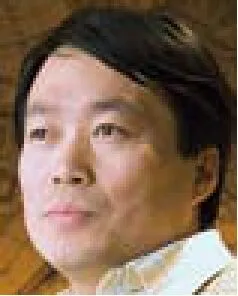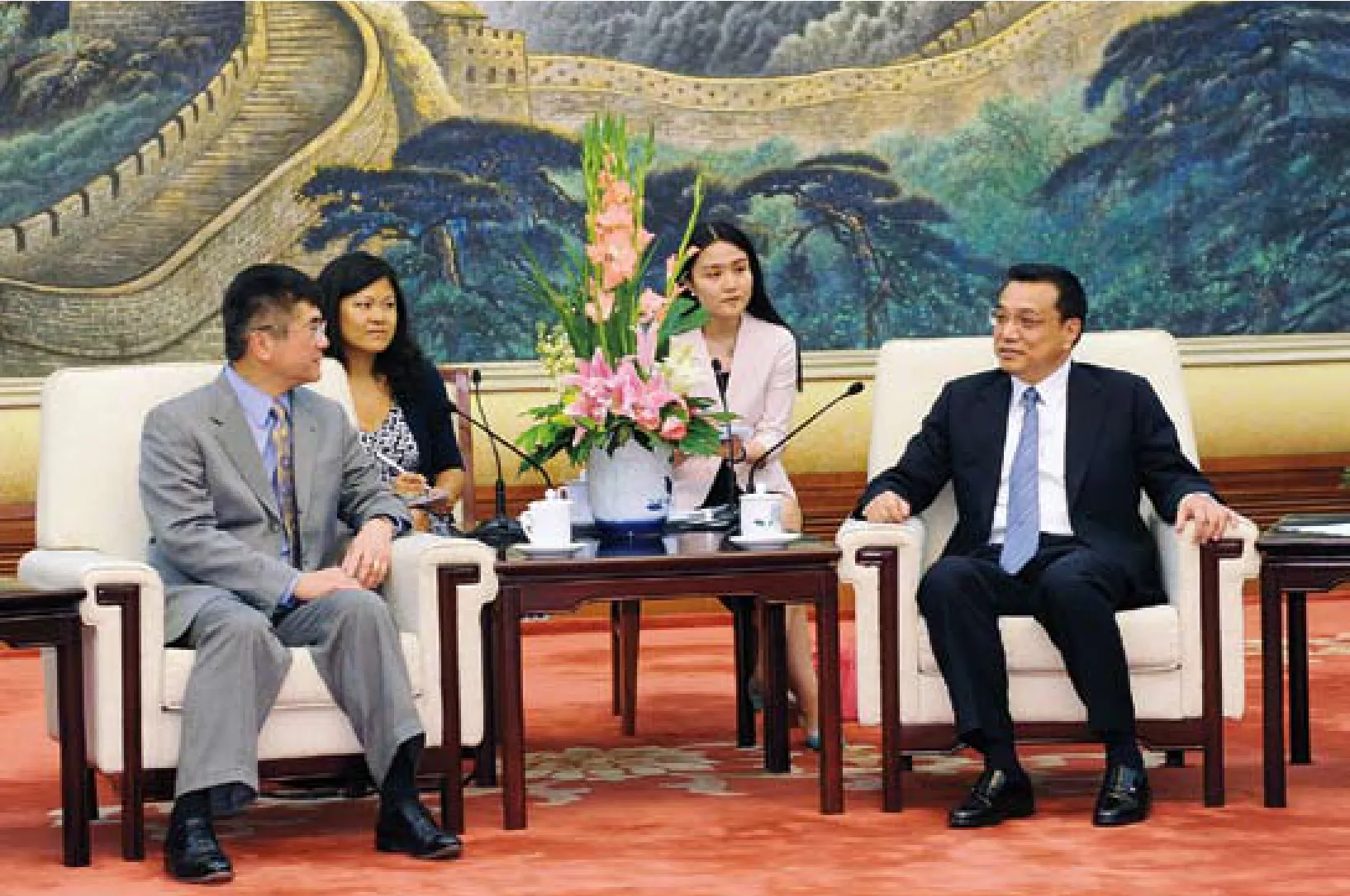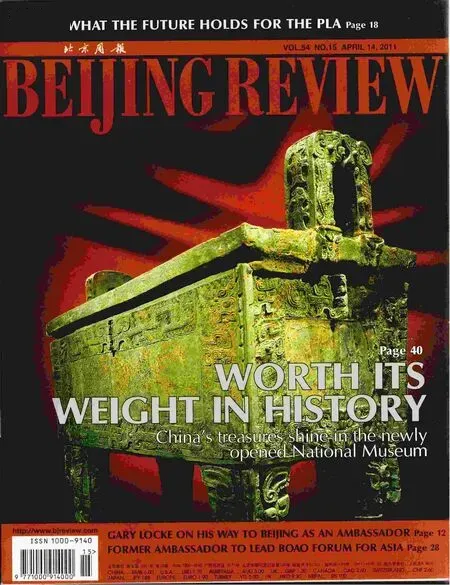America’s Next Ambassador
2011-10-14ByZHANGGUOQING
By ZHANG GUOQING
America’s Next Ambassador
By ZHANG GUOQING
Recently nominated U.S. Ambassador to China Gary Locke will face challenges in bridging Sino-U.S. relations

Recently, U.S.President Barack Obamanom inated Commerce Secretary Gary Locke to be the next U.S. ambassador to China. Locke, once approved by the U.S. Congress, will replace current Ambassador Jon Huntsman in April. Once he arrives in Beijing, Locke will be the fi rst Chinese American, not to mention the fi rst high-pro fi le cabinet member, to take this job. The nomination shows the United States’ understanding and appreciation for Sino-U.S. relations and the importance of maintaining this bond.
Economic motives
Two major events may have prompted Obama’s decision to nominate Locke.
One was Chinese President Hu Jintao’s state visit to the United States in January.The visit was a turning point in chilled Sino-U.S. relations that suffered numerous setbacks, including U.S. arms sales to Taiwan and trade disputes, in 2010.
Locke’s Chinese ancestry, despite not being able to speak fl uent Mandarin, presents a friendly face for the Chinese people to associate with. His nomination should help improve Sino-U.S. relations to some degree based on this alone.
Obama made it clear that there is nobody more quali fi ed for this position than Locke when announcing the nomination.The U.S. president also stressed the Sino-U.S. relationship is one of the most critical bilateral relationships of the 21st century.
The second event was Obama’s economic reform—reform that has yet to materialize. Obama and his economic team once had the hope and trust of the American people on their side, but lackluster results have prevented him from delivering on his promises. So not only does Obama face a fiscal deficit, he also faces a trust de fi cit.
In order to reduce this trust de fi cit, and to better prepare for the 2012 presidential election, Obama will have to table certain disputes and issues and focus on matters of immediate public concern. One of those disputable issues was trade with China.
Obama’s State of the Union address in January was proof of this change. Obama spoke of the challenges facing the U.S.economy, focusing on the importance of innovation and improving people’s livelihoods. Employment also received considerable attention.
Following the speech, he issued a series of economic stimulus plans to increase investment in high-speed railways, wireless networks and new energy, among others.To improve the U.S. economy and create more job opportunities, it will be essential for the United States to maintain good relations with China.
After a year of fluctuations in Sino-U.S. relations, Obama realized failing to mend ties with China could become one of his biggest mistakes as president.Neglecting the vigorous Chinese market,with the global economy sluggish as it is,could be an even bigger one.
Top choice
Unlike current Ambassador Huntsman,who emphasizes environmental protection,culture and education, Locke’s commercial background will open up more opportunities to develop and maintain ties with China.Locke is also a better choice to promote Obama’s export plan—he is a loyal supporter and strong promoter of Obama’s plan to double exports.
As commerce secretary, Locke has visited China many times, and every visit was made to advance Obama’s export goal.His work proved effective. In 2010, the United States’ exports to China increased 34 percent.
The change of envoys was not without peculiarities—Huntsman, with his foreign face and features, speaks Mandarin, while Locke, with his Chinese appearance, does not. But both have a re fi ned understanding of China and the country’s culture.
Locke also has experience in handling affairs involving China, at least in the commercial fi eld. Before joining Obama’s cabinet,he already had a good knowledge of handling economic and trade relations with China.
During his two terms as governor of Washington, he supported Boeing, Microsoft and other companies with a strong interest in China. He also encouraged the state to boost its exports to China, which eventually reached more than $5 billion a year, double fi gures from his predecessors.
As commerce secretary, Locke has spent time addressing issues such as the yuan’s exchange rate and the protection of intellectual property rights in China. Through his adept knowledge of Chinese business and culture,he has been able to effectively promote U.S.companies’ interests in China. As ambassador, and with his insight into the problems U.S. companies have while operating in China, he will surely spare no efforts to further their interests.
Locke has also made it a point throughout his career to establish good relations with Chinese companies. He has personal contacts with many Chinese entrepreneurs and government of fi cials, who visit Locke during their travels to the United States. In this sense, Locke is a strong bridge between China and the United States.
U.S. Ambassadors to China
Jon Huntsman (Since August 2009)
Clark Randt (July 2001-January 2009)
Joseph Prueher (December 1999-May 2001)
James Sasser (February 1996-July 1999)
Stapleton Roy (August 1991-June 1995)
James Lilley (May 1989-May 1991)
Winston Lord (November 1985-April 1989)
Arthur Hummel (September 1981-September 1985)
Leonard Woodcock (March 1979-February 1981)
(Source:beijing.usembassy-china.org.cn)
Impact on relations
The fact that Obama is sending an acting cabinet member to serve as U.S. ambassador to China illustrates the importance of China in his long-term economic strategy. Locke is the fi rst cabinet member to assume this role since 1979, when China and the United States established diplomatic relations.
This decision shows the Obama administration’s emphasis on Sino-U.S. economic and trade relations. It wants an expert and it just happens to have one in its ranks.
The major task for a U.S. ambassador to China is to deliver information between the Chinese Government and the U.S.Government, and help solve bilateral issues that may arise during his tenure. Issues involving economic and trade relations will certainly be Locke’s priority.
Locke’s appointment may send a message the United States will shift its attention to economic and trade cooperation from geopolitical issues, which plagued Sino-U.S. relations throughout last year.
China needs to take note that Obama’s recent measures show economic diplomacy may become his policy orientation for the next two years.
Locke’s Chinese ancestry presents a double-edged sword situation. As a political fi gure, he cannot go overboard with his intimacy for China and its culture; otherwise, it will be dif fi cult for him to get approval from politicians in the United States.
This is similar to Obama’s and his predecessor George W. Bush’s respective visits to China. Though they smiled and behaved friendly while in China, at their next stops they often expressed dissatisfaction or even criticism of China.
The Chinese people don’t need to be too excited for Locke’s arrival. His selection was nothing more than Obama’s pick of the right man for the job based on political considerations. It could be a show of goodwill. But winning political and economic victories for the United States and maintaining prosperous relations with China are the ultimate aims of the nomination.
The author is a research fellow with the Chinese Academy of Social Sciences

BUSINESS ADVOCATE:U.S. Commerce Secretary Gary Locke talks with Chinese Vice Premier Li Keqiang in Beijing on May 20,2010, during Locke’s visit to China
